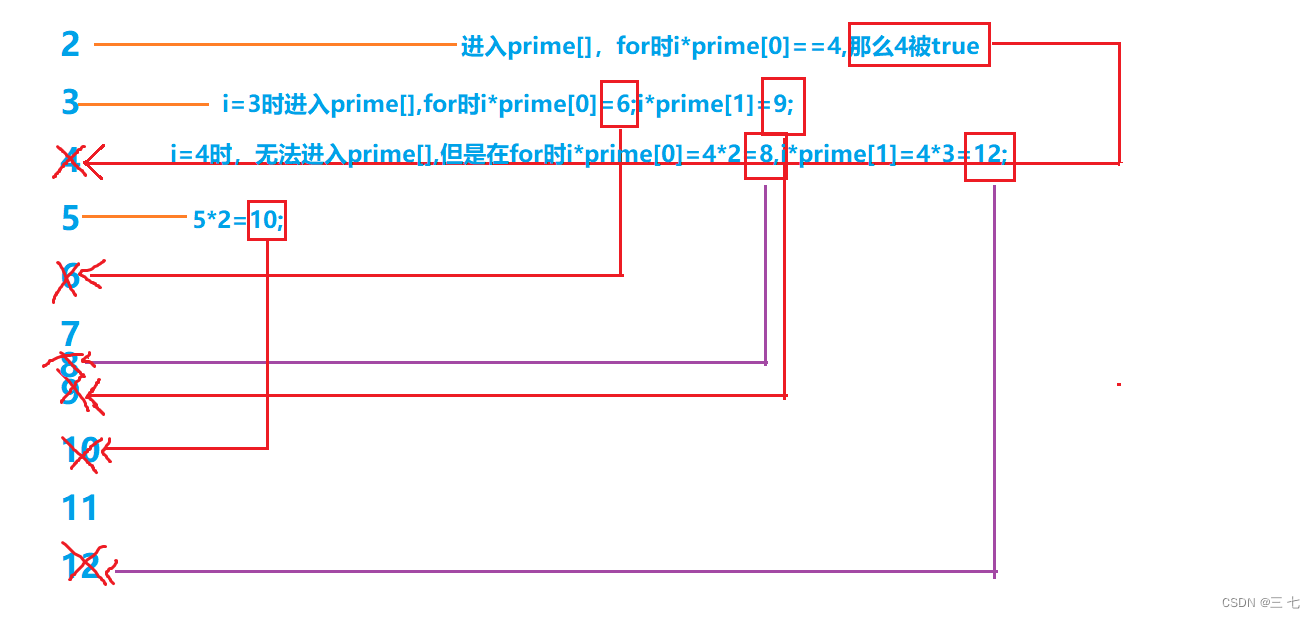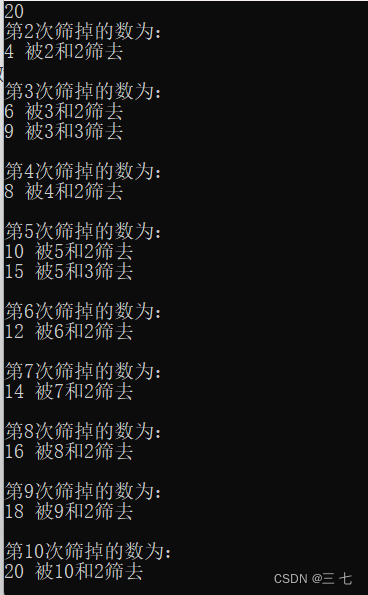热门标签
热门文章
- 1cuda11安装tensorflow-gpu1.15_tensorflow 1.15 在cuda11.0上运行
- 2Linux安装PHP环境,详细步骤以及常见问题解决方案
- 3如何使用 Python 3 中的 Requests 和 Beautiful Soup 处理 Web 数据
- 4【Linux】多线程01 --- 理解线程 线程控制及封装
- 5Egret UI Editor1.12.0 升级辅助修改exml工具_eui 1.12
- 6自动构建和原理分析(1)--理论_自动构建什么意思?
- 7python的环境变量配置方法 详细教程_python 环境变量
- 8thinkPHP实现对象存储oss,将图片上传到阿里云oss_thinkphp 怎么把服务器图片上传到oss
- 9bat 后台执行脚本_后台执行bat
- 10[数学 位运算 哈希表] 268. 缺失数字(排序法 → HashSet → 位运算、数学计算+避免溢出)_hashset查找缺少的值
当前位置: article > 正文
筛选质数的三种方法方法_质数筛选法
作者:AllinToyou | 2024-02-10 19:56:09
赞
踩
质数筛选法
筛选质数的方法
(1)朴素筛法(时间复杂度O(n))
将比自己小的数字并且大于1的数枚举出来,看看能不能除余,这个是我们最除学筛质数的方法,比较的好理解,我们直接上代码:
#include<bits/stdc++.h> using namespace std; bool cheak(int x) { if(x<=1) return false; if(x==2) return true; for(int i = 2;i < x;i ++ ) { if(x%i==0) return false; } return true; } int main() { int n; cin >> n; while(n--) { int x; cin >> x; if(cheak(x)) cout<<"Yes"<<endl; else cout<<"No"<<endl; } return 0; }
- 1
- 2
- 3
- 4
- 5
- 6
- 7
- 8
- 9
- 10
- 11
- 12
- 13
- 14
- 15
- 16
- 17
- 18
- 19
- 20
- 21
- 22
- 23
- 24
- 25
- 26
朴素筛法的优化:(时间复杂度优化到O(sqrt(n))
实际上,对于任何一个数n,我们如果有两个数a,b(a,b>=2 && a,b<n)有ab==c,我们只需要将i枚举到a,也就是 i<n/b,
但是对于b来说一定比i大,所以我们只需要枚举到i<n/i.
bool cheak(int x)
{
if(x<=1) return false;
if(x==2) return true;
for(int i = 2;i <= x/i;i ++ )
{
if(x%i==0) return false;
}
return true;
}
- 1
- 2
- 3
- 4
- 5
- 6
- 7
- 8
- 9
- 10
(2)埃式筛(时间复杂度O(nloglongn))
注意:这里是判断从1到n每一个数是不是质数的时间复杂度,所以平均每一个时间复杂度应该是O(longn)
我们先用一个数组prime[]来储存每一个质数,用bool st[]来储存一个数是不是质数
**时间复杂度的分析:**没有打错,就是nloglogn,我们将每一个数的倍数全部标记为非质数(true)
/* -------------------------- 对于1到n的数: 2的倍数有2/n个 3的倍数有3/n个 ... n的倍数有n/n个 -------------------------- 我们只需要全部加起来就是他的时间复杂度: 2/n+3/n+4/n+...+n/n=nlogn (数学上的调和级数) 但是我们知道:1---n有n/logn个质数 那么结果是(n/logn)*(logn)=n but-->实际上不是O(n)的时间复杂度,是O(nloglongn) */
- 1
- 2
- 3
- 4
- 5
- 6
- 7
- 8
- 9
- 10
- 11
- 12
- 13
- 14
- 15
- 16
具体的时间复杂度分析可以参考:通俗易懂的埃氏筛时间复杂度分析
下面给出板子:
const int N = 1e6+10; int prime[N]; bool st[N]; //埃式筛 void get_primes(int n) { int cnt=0; for(int i = 2;i <= n;i ++ ) { if(!vis[i]) { primes[cnt++]=i; for(int j = i*2;j <= n;j += i) vis[j]=true; } } }
- 1
- 2
- 3
- 4
- 5
- 6
- 7
- 8
- 9
- 10
- 11
- 12
- 13
- 14
- 15
- 16
- 17
- 18
- 19
(3)线性筛(时间复杂度是真真正正的o(n))
我们先来看代码,再来分析原理:
//线性筛
void get_primes(int n)
{
int cnt = 0;
for(int i = 2;i <= n;i ++ )
{
if(!vis[i]) primes[cnt++]=i;
for(int j = 0;primes[j] <= n/i;j ++ )
{
vis[primes[j]*i] = true;
if(i%primes[j]==0) break;
}
}
}
- 1
- 2
- 3
- 4
- 5
- 6
- 7
- 8
- 9
- 10
- 11
- 12
- 13
- 14
时间复杂度的分析:
为什么说时间复杂度是真真正正的O(n)呢?
是因为每一个数只被筛选了一次:

当然,严禁的证明也要给出来:
每一个数都可以写成质因子的乘积:

然后每一个数在他的前一个质因子里面会提前被筛(像上面的10被5*2筛去),也就是说一个数会被pi的数里面被筛一次
比如数字56,他的质因子为—>2 * 2 * 2 * 7,而不会表现为4 * 2 * 7或者4*14的形式,应该是28 * 2的形式
我们来看一下他的筛选过程:
#include<bits/stdc++.h> using namespace std; const int N = 1e8+10; int primes[N]; bool vis[N]; //线性筛 void get_primes(int n) { int cnt = 0; for(int i = 2;i <= n;i ++ ){ if(!vis[i]) primes[cnt++]=i; cout<<"第"<<i<<"次筛掉的数为:"<<endl ; for(int j = 0;primes[j] <= n/i;j ++ ){ cout<< primes[j]*i <<" "<<"被"<<i<<"和"<<primes[j]<<"筛去"<<endl; vis[primes[j]*i] = true; if(i%primes[j]==0) break; } cout<<endl; } cout<<cnt<<endl; } int main() { int n; cin >> n; get_primes(n); return 0; }
- 1
- 2
- 3
- 4
- 5
- 6
- 7
- 8
- 9
- 10
- 11
- 12
- 13
- 14
- 15
- 16
- 17
- 18
- 19
- 20
- 21
- 22
- 23
- 24
- 25
- 26
- 27
- 28
运行结果:

学是昨天学的,码是今天码的
声明:本文内容由网友自发贡献,不代表【wpsshop博客】立场,版权归原作者所有,本站不承担相应法律责任。如您发现有侵权的内容,请联系我们。转载请注明出处:https://www.wpsshop.cn/w/AllinToyou/article/detail/75350
推荐阅读
相关标签
Copyright © 2003-2013 www.wpsshop.cn 版权所有,并保留所有权利。



